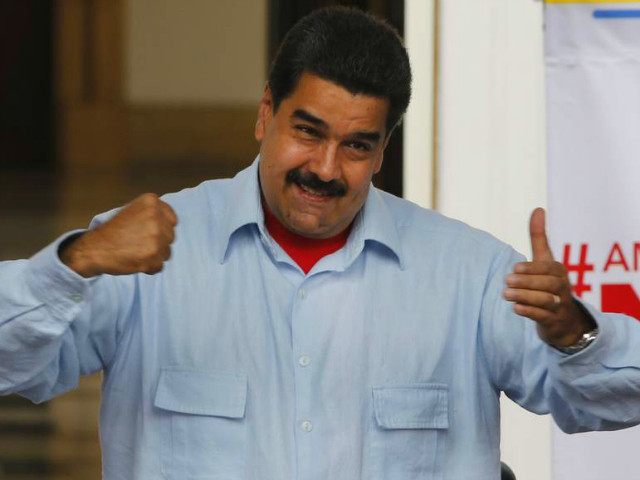Venezuela’s National Assembly may soon be replaced by a “Constituents’ Assembly” that will draft a new constitution, according to the nation’s socialist dictator Nicolás Maduro.
The assembly will replace the federal legislature, according to Maduro, until a new constitution redesigns the structure of the national government. Hugo Chávez implemented the current constitution in 1999, which granted the expansive executive powers used by Maduro today.
Maduro announced the move to establish a citizens’ assembly this week, providing few details. He had previously announced “there isn’t any” National Assembly, suggesting that the nation’s legislative body – currently run by opposition leaders – had lost its authority under his rule entirely. Maduro officials suggested that part of the reason for creating this alternative legislature was to set the table for national elections, controlled by Maduro’s National Center for Elections (CNE).
“One of the aims of the constituent assembly is to seek the conditions of stability to be able to go to those electoral processes. Those conditions of normality do not exist,” Elía Jaua, a former vice president who would run the Constituents’ Assembly, said on television Tuesday.
Aristóbulo Istúriz, another official holding the title Vice President of Territorial Socialism, called the new assembly a “superior dialogue for peace.” He assured viewers on national television that choosing who is represented in the assembly will be “as democratic a process as possible.” He claimed the changes to the Constitution would “amplify and extend” it, not merely rewrite it, a nod to Chávez loyalists who responded to the constitutional plan with alarm.
Opposition members in the National Assembly have decried the move as an attempt to usurp their power, granted to them by a democratic vote. Diosdado Cabello, the former socialist president of the National Assembly and current minority leader, appeared to confirm those fears on television Monday, telling reporters, “I don’t pay any attention to what the National Assembly says, since that is an institution that does not exist at this moment.”
The move follows a failed attempt by the socialist-controlled Supreme Court to dissolve the legislature. In March, the Supreme Court issued a ruling declaring itself the nation’s lawmaking body and nullifying the National Assembly entirely, as well as stripping legislators of their government immunity. The Supreme Court walked back the ruling, but Venezuelans – struggling against growing food and medicine shortages and deprived of political rights – have not stopped taking the streets to protest since the ruling came down.
This was but the latest attempt to invalidate the National Assembly since Venezuelans overwhelmingly voted an opposition majority to rule the body. In December 2015, following the elections that gave the opposition a majority in the National Assembly, Maduro announced that he would create a “Communal Parliament” made up only of socialists, who would serve as legislators instead of the Assembly. That attempt to deprive the Assembly of power was unsuccessful, as the National Assembly dismissed it as “unconstitutional nonsense” and the government never filled the positions in that assembly.
In January 2016, a month after the legislative elections, the Supreme Court declared the entire legislature “void,” claiming that multiple legislators had earned their seats by fraud. The opposition and the Venezuelan people ignored the decree and continued to attempt to pass laws, including a law to free the nation’s political prisoners. The Supreme Court declared that law unconstitutional.
The opposition has similarly responded to the latest attempt to create a parallel legislature with outrage, calling it a “giant fraud” and a violation of the nation’s constitutional order. National Assembly President Julio Borges, Reuters notes, called the experiment a “trap” to prevent his ouster. “What the Venezuelan people want isn’t to change the constitution but to change Maduro through voting,” he insisted.

COMMENTS
Please let us know if you're having issues with commenting.